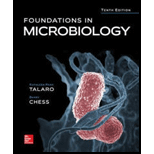
Foundations in Microbiology
10th Edition
ISBN: 9781259705212
Author: Kathleen Park Talaro, Barry Chess Instructor
Publisher: McGraw-Hill Education
expand_more
expand_more
format_list_bulleted
Textbook Question
Chapter 17.1, Problem 3CYP
Explain why it is important to prevent microbes from growing in specimens, and why speed is so important in the clinical laboratory.
Expert Solution & Answer
Want to see the full answer?
Check out a sample textbook solution
Students have asked these similar questions
Explain how a wire loop and wire needle is used in microbiology laboratory.
Describe how specimen collection is performed using aseptic techniques to isolate medically significant bacteria and identify these clinically important bacterial species, Escherichia coli, Streptococcus pneumonia, Haemophilus influenzae and Streptococcus pyogenes by using different staining techniques and biochemical tests. Evaluate the effectiveness of different biochemical techniques used to identify different bacterial species.
Provide three reasons why the use of aseptic technique is essential when handling microbial cultures in the laboratory.
Chapter 17 Solutions
Foundations in Microbiology
Ch. 17.1 - Describe what is involved in the main categories...Ch. 17.1 - Explain several techniques in specimen collection...Ch. 17.1 - Summarize the main procedures in isolation,...Ch. 17.1 - Summarize the major techniques in identifying and...Ch. 17.1 - Describe the general principles in specimen...Ch. 17.1 - Explain why it is important to prevent microbes...Ch. 17.1 - Summarize the kinds of tests that are used to...Ch. 17.2 - Describe some direct methods of testing a...Ch. 17.2 - Summarize the aims in selection of culture...Ch. 17.2 - Prob. 6ELO
Ch. 17.2 - Describe how flowcharts and comparison tables are...Ch. 17.3 - Explain the different variations on genetic...Ch. 17.3 - Describe what is involved in direct specimen...Ch. 17.3 - Prob. 6CYPCh. 17.3 - Describe the applications of PCR in identification...Ch. 17.4 - Describe the background aims of immunologic...Ch. 17.4 - Identify how antigen-antibody reactions are...Ch. 17.4 - Prob. 11ELOCh. 17.4 - Explain the basic methods behind the Western blot...Ch. 17.4 - Prob. 13ELOCh. 17.4 - What is the basis of serology and serological...Ch. 17.4 - Differentiate between specificity and sensitivity.Ch. 17.4 - Prob. 10CYPCh. 17.4 - Prob. 11CYPCh. 17.4 - Prob. 12CYPCh. 17.4 - Prob. 13CYPCh. 17.4 - Give examples of several tests that employ...Ch. 17.4 - What is meant by complement fixation? What are...Ch. 17.4 - Prob. 16CYPCh. 17.5 - Describe the concepts behind the main types of...Ch. 17.5 - Prob. 15ELOCh. 17.6 - Prob. 16ELOCh. 17.6 - Prob. 17CYPCh. 17.6 - Prob. 18CYPCh. 17.6 - Prob. 19CYPCh. 17.6 - Prob. 20CYPCh. 17.6 - Observing figure 17.17, indicate whether each...Ch. 17.L1 - Multiple Matching. Match each of the following...Ch. 17.L1 - Prob. 2MCQCh. 17.L1 - Prob. 3MCQCh. 17.L1 - Prob. 4MCQCh. 17.L1 - A patient with a _____ titer of antibodies to an...Ch. 17.L1 - Prob. 6MCQCh. 17.L1 - Prob. 7MCQCh. 17.L1 - An example of an in vivo serological test is a....Ch. 17.L1 - Which of the following specimens must be removed...Ch. 17.L1 - Prob. 1CSRCh. 17.L1 - Prob. 2CSRCh. 17.L1 - Prob. 3CSRCh. 17.L1 - Prob. 1WCCh. 17.L1 - Prob. 2WCCh. 17.L1 - Briefly describe the principles and give an...Ch. 17.L1 - Prob. 4WCCh. 17.L1 - Prob. 5WCCh. 17.L1 - Prob. 6WCCh. 17.L2 - Prob. 1CTCh. 17.L2 - Prob. 2CTCh. 17.L2 - Why do some tests for antibody in serum (such as...Ch. 17.L2 - Prob. 4CTCh. 17.L2 - Prob. 5CTCh. 17.L2 - Prob. 6CTCh. 17.L2 - From chapter 3, fig 3.17a (reproduced on the...Ch. 17.L2 - Prob. 2VC
Knowledge Booster
Learn more about
Need a deep-dive on the concept behind this application? Look no further. Learn more about this topic, biology and related others by exploring similar questions and additional content below.Similar questions
- Transparent double-sided dishes used for growing microbes are most commonly called A) Petri dishes. B) baker dishes. C) sterilization plates. D) culture medium plates.arrow_forwardDescribe the step by step method of preparing culture media in microbiology.arrow_forwardwho introduced the use of cotton plug in microbial culture tubes.arrow_forward
- Explain the significance of aseptic culture technique in growing microorganisms.arrow_forwardExplain why specimens should be taken aseptically and processed quickly to ensure accurate results, even when nonsterile sites are being sampled and selective media are to be used.arrow_forwardAseptic technique refers to A) the microbial inoculum placed into a test tube or onto a Petri plate. B) a series of practices to avoid contamination. C) the autoclave and other sterilizing procedures. D) cleanliness in the laboratory.arrow_forward
- Describe the use of microscopy to identify microorganisms in patient specimensarrow_forwardThe statement, “In the laboratory, a sterile inoculating loop is moved across the agar surface in a culture dish, thinning a sample and isolating individuals", describes which technique?arrow_forwardDescribe the difference between batch and continuous culture techniquesarrow_forward
- Describe three problems associated with using the standard plate count method for determining the number of bacteria in a sample.arrow_forwardHow to prepare an agar plate for bacteria? How to include the antibiotics into agar plates? How long should you wait for bacterial colonies to grow on agar plates? What is the appropriate temperature?.arrow_forwardThe techniques for identifying unknown bacteria can be summarized in three key steps, explain in your own words how to: Staining the unknown for initial characterization by microscopy. Using a dichotomous key strategy to systematically rule out other organisms. Testing the organism for key biochemical traits.arrow_forward
arrow_back_ios
SEE MORE QUESTIONS
arrow_forward_ios
Recommended textbooks for you

Biochemical Tests-Part 1; Author: Southern Stacker;https://www.youtube.com/watch?v=a-i9vANfQWQ;License: Standard Youtube License